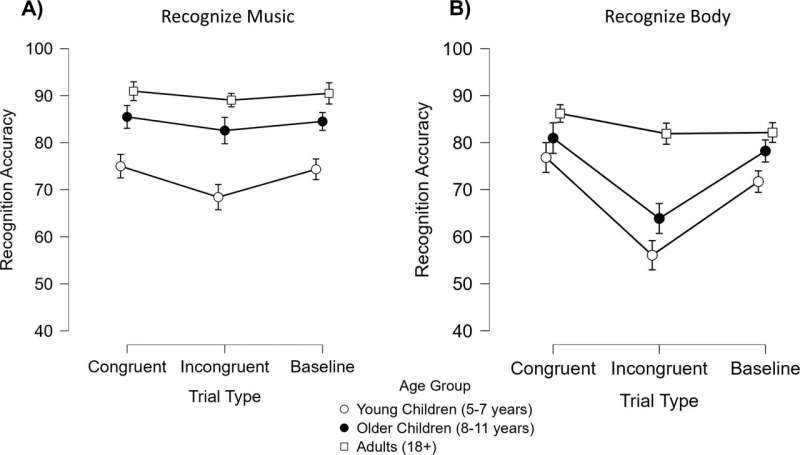This article has been reviewed according to Science X's editorial process and policies. Editors have highlighted the following attributes while ensuring the content's credibility:
fact-checked
peer-reviewed publication
trusted source
proofread
Understanding how music can influence children's emotional recognition

A new study led by Dr. Paddy Ross of the Durham University Psychology Department has shown that music can significantly influence emotion recognition in children.
Understanding auditory dominance
This latest research further develops understanding of what is known as 'child auditory dominance', where children prioritize what they can hear, rather than what they see, when determining the emotions of a situation.
In this latest research Ross and his team show that auditory dominance in relation to emotional recognition in young children applies to music, as well as human voices (which Ross had previously found in an earlier study).
Importance of sound
The study involved volunteers in three age categories: seven and under, eight to 11, and over 18.
Each group was shown pictures of humans, with faces blurred, depicting happy or fearful emotions while short emotional music bursts of happy or fearful music was played.
Children were significantly worse at recognizing emotions in the body when incongruent (emotionally different) musical bursts were being played.
For example, where they could otherwise recognize a fearful body over 80 percent of the time, this dropped to below 60 percent when they heard—and were told to ignore—happy musical bursts while looking at the people.
Wired for sound
The study indicates that while we tend to focus a lot on what children see or what they watch, what they are hearing in a situation could be more important in terms of their emotional understanding and recognition.
The findings could help parents, caregivers, and even medical professionals to use music as a means of encouraging positive emotional engagement from children in a range of situations.
For example, playing positive and upbeat music could help children form a positive emotional association with a potentially stressful situation such as a trip to the dentist or even mundane tasks like homework.
The Durham team now want to look at whether children misunderstand the emotions of characters in stories based on how we read to them.
They also want to explore whether auditory dominance is more pronounced in children with socio-emotional conditions, such as Autism Spectrum Conditions.
The research is published in the Journal of Experimental Child Psychology.
More information: Paddy Ross et al, Turn that music down! Affective musical bursts cause an auditory dominance in children recognizing bodily emotions, Journal of Experimental Child Psychology (2023). DOI: 10.1016/j.jecp.2023.105632





















